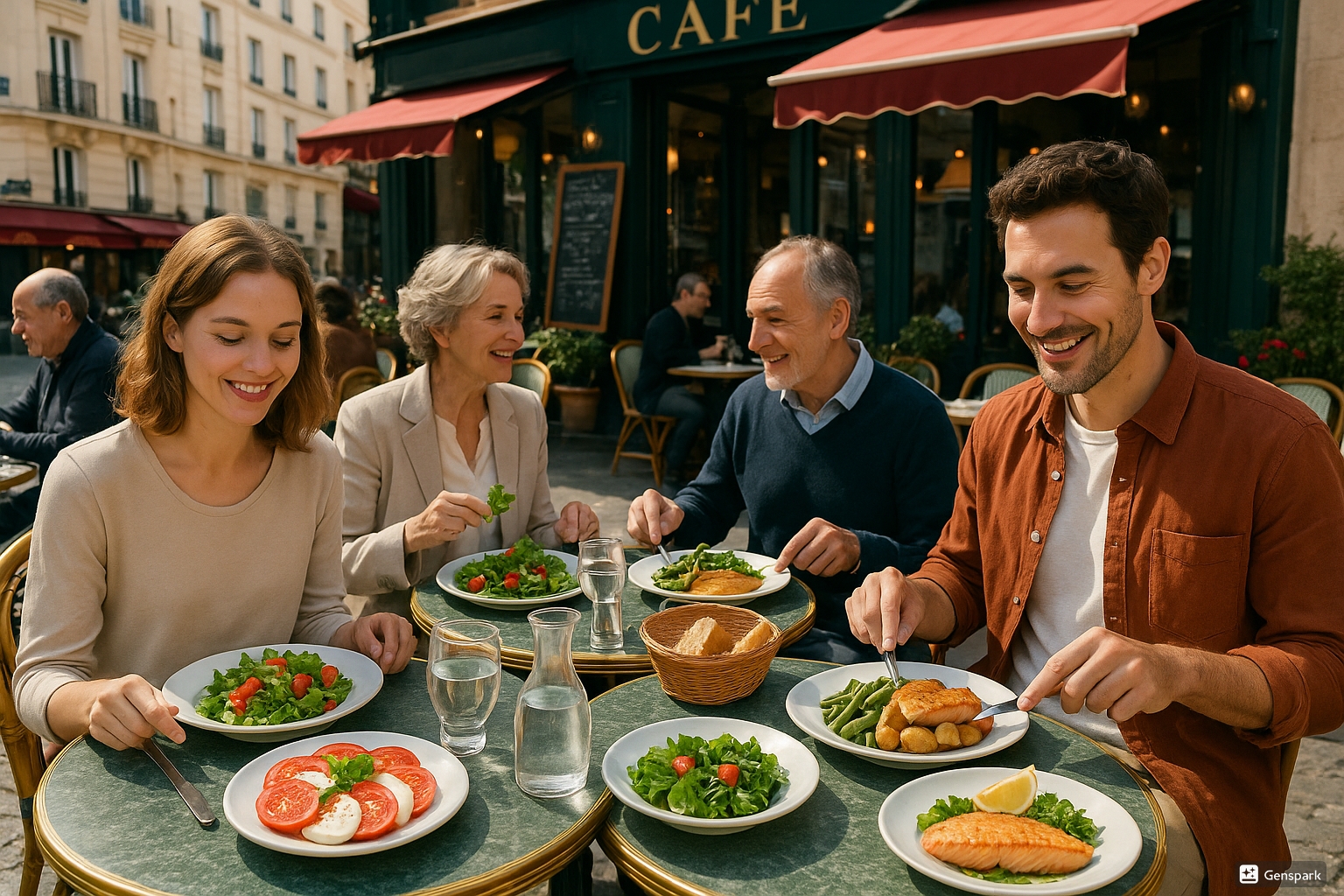The French Approach to Wellness: Natural Fitness Without the Gym
Discovering how the French maintain health and vitality through simple daily practices
While much of the world obsesses over fitness trackers, protein shakes, and high-intensity training regimens, the French have mastered a refreshingly different approach to staying healthy. Their secret doesn't involve counting calories or spending countless hours at the gym. Instead, it embraces a holistic lifestyle that naturally incorporates movement, balanced nutrition, and genuine enjoyment.
The French philosophy of wellness offers valuable lessons that can transform how we think about health and fitness. Let's explore six principles that define the French approach to staying fit – principles that might just change your perspective on what it means to be truly healthy.

The Art of Moderation: Finding Balance in All Things
At the heart of French wellness lies a profound commitment to moderation – a concept that seems deceptively simple yet proves elusive for many. Unlike restrictive diets that demonize entire food groups, the French approach celebrates variety while emphasizing restraint.
This moderation extends to every aspect of dining. The French typically enjoy three proper meals daily, savoring each bite mindfully rather than rushing through their food. Snacking between meals is rare, allowing the body to fully digest before the next meal. Portion sizes remain sensible – enough to satisfy without excess.
What makes this approach sustainable is its flexibility. There are no "forbidden" foods in the French mindset. A weekly pastry, a glass of wine with dinner, or a piece of fine chocolate can all be part of a balanced lifestyle when consumed with awareness and appreciation. This eliminates the cycle of restriction and bingeing that plagues many diet-focused cultures.
"The secret isn't deprivation – it's appreciation. When you truly savor every bite, you naturally need less to feel satisfied."
Movement for Joy: The Pleasure Principle in Exercise
The French approach to physical activity stands in stark contrast to the "no pain, no gain" mentality prevalent elsewhere. Rather than viewing exercise as a form of punishment or obligation, the French prioritize activities that bring genuine pleasure. This fundamental shift in perspective transforms exercise from a chore into a cherished part of daily life.
You'll rarely find French people enduring grueling workout routines they despise. Instead, they gravitate toward activities that offer mental and emotional benefits alongside physical ones. Cycling through scenic countryside routes, swimming in beautiful locations, skiing in the mountains, or practicing yoga for its calming effects – the focus remains on holistic enjoyment rather than merely burning calories.
This pleasure-centered approach ensures consistency, as we naturally continue activities we enjoy. It also prevents the burnout and injury risks associated with extreme exercise regimens. The French recognize that sustainable fitness comes from finding physical activities that nourish both body and spirit.
Perpetual Motion: Incorporating Movement Into Everyday Life
Perhaps the most distinctive aspect of French fitness culture is how seamlessly movement integrates into daily routines. Rather than compartmentalizing exercise as a separate activity requiring special clothes and equipment, the French build physical activity into the fabric of everyday life.
Walking stands at the center of this philosophy. French cities and towns, with their pedestrian-friendly layouts, naturally encourage walking as a primary mode of transportation. A French person might easily accumulate several miles of walking daily – to work, to markets, to meet friends – without ever considering it "exercise." This constant, moderate activity maintains metabolism, muscle tone, and cardiovascular health.
Stairs present another opportunity for natural movement. Many French apartment buildings lack elevators, making stair-climbing an unavoidable daily activity. These small but consistent physical challenges contribute significantly to overall fitness without requiring dedicated workout time.
By embracing these natural movement opportunities rather than seeking shortcuts, the French maintain baseline fitness as part of their cultural identity rather than as an additional responsibility to manage.

The Kitchen Connection: Nutrition as the Foundation of Fitness
The French have a saying that loosely translates to: "Your abs are made in the kitchen, not the gym." This wisdom acknowledges that no amount of exercise can compensate for poor nutrition. Rather than processed convenience foods, the French diet centers around whole, fresh ingredients prepared with care.
Seasonal produce forms the cornerstone of French cooking, ensuring maximum nutritional value and flavor. Meals feature reasonable portions of high-quality proteins, complex carbohydrates, and healthy fats – creating satisfying combinations that provide sustained energy without blood sugar spikes and crashes.
The French approach to food shopping also contributes to nutritional quality. Many still shop at specialized markets – visiting the baker for bread, the butcher for meat, and produce markets for fresh fruits and vegetables. This tradition naturally limits the consumption of heavily processed foods while supporting connection with food sources.
Perhaps most importantly, mealtime remains a sacred ritual rather than an inconvenience to rush through. By sitting down to properly prepared meals eaten mindfully and often shared with others, the French transform nutrition from a mathematical equation of calories and macronutrients into a pleasurable, health-supporting ritual.
The Relaxation Requirement: Rest as Essential to Wellness
Unlike cultures that glorify constant productivity, the French recognize the vital importance of rest and relaxation in the overall wellness equation. Proper downtime isn't viewed as laziness but as an essential component of a balanced, healthy life.
With generous vacation policies (typically five to six weeks annually), the French prioritize substantial breaks that allow for complete mental and physical rejuvenation. These aren't merely token days off but meaningful periods of disconnection from work stresses. Whether relaxing at a countryside retreat, visiting a thermal spa town, or simply enjoying extended family meals, these rest periods provide crucial recovery time.
Even day-to-day relaxation receives proper attention. Extended lunch breaks remain common in many regions, allowing for a midday reset. Evening leisure time typically prioritizes connection and unwinding rather than squeezing in more productivity. This rhythm acknowledges the body's need for recovery and the mind's requirement for periods of lower stimulation.
By honoring relaxation as equally important to activity, the French create a sustainable approach to wellness that prevents burnout and supports longevity. Their example reminds us that true health encompasses not just what we do but also how we rest.
Lifelong Vitality: Wellness Without Age Limitations
Perhaps the most inspiring aspect of the French approach to fitness is its lifelong nature. Unlike cultures where athletic pursuits are often abandoned after youth, the French embrace an ageless attitude toward health and movement.
Visit any French park or swimming pool, and you'll find people of all ages engaging in physical activities. Elderly individuals regularly participate in cycling groups, hiking clubs, or swimming sessions. This normalization of lifelong movement creates powerful role models and community support for continued activity at every age.
The French also demonstrate remarkable openness to beginning new physical activities in middle or later life. Learning to sail at 60, joining a walking club at 70, or starting yoga at 65 isn't viewed as unusual but as a natural continuation of life's adventures. This mindset prevents the resignation to inactivity that often accompanies aging in other cultures.
By maintaining this age-inclusive approach to wellness, the French create communities where vitality remains accessible throughout life's journey. Their example demonstrates that fitness isn't primarily about youthful appearance but about maintaining functionality, independence, and joy across the entire lifespan.
Embracing the French Approach to Wellness
The French wellness philosophy offers a refreshing alternative to fitness trends that often prove unsustainable. By centering moderation, pleasure, natural movement, quality nutrition, proper rest, and lifelong engagement, this approach creates a blueprint for health that feels liberating rather than restrictive.
Adapting these principles doesn't require relocating to France. We can incorporate French wellness wisdom by walking more in our daily routines, preparing simple meals with fresh ingredients, finding physical activities we genuinely enjoy, practicing moderation rather than deprivation, prioritizing adequate rest, and rejecting arbitrary age limitations on fitness.
The ultimate lesson from the French approach is that true wellness emerges not from extreme measures but from thoughtfully designed daily habits that honor both pleasure and health. When we stop viewing fitness as separate from life and instead weave it naturally into our everyday experiences, we discover a sustainable path to vitality that can serve us throughout the entire ways along the world